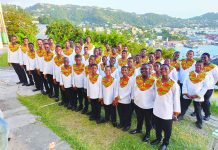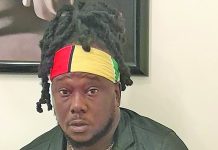By Lakhram Bhagirat
We all have it in us to be elements of great change, but in order for us to achieve the change we want to see, it requires a great deal of commitment and, quite often, sacrifices. Sometimes that change would require us to uproot our lives in order for us to develop our skills.
That was exactly what Dr Rajendra Sukhraj had to do almost eight years ago when he decided that Guyana needed more doctors in the urological field. Dr Sukhraj recently returned to Guyana after spending almost eight years in Trinidad at the San Fernando General Hospital where he received his urology subspecialty training.
According to the American Urological Association, “urology is a part of health care that deals with diseases of the male and female urinary tract — kidneys, ureters, bladder and urethra. It also deals with the male organs that are able to make babies — penis, testes, scrotum, prostate. Since health problems in these body parts can happen to everyone, urologic health is important.”
Urology is known as a surgical specialty. Besides surgery, a urologist is a doctor with the wisdom of internal medicine, paediatrics, gynaecology and other parts of health care. This is because a urologist encounters a wide range of clinical problems. The scope of urology is big and the American Urological Association has named seven subspecialty parts:
Paediatric Urology (children’s urology)
Urologic Oncology (urologic cancers)
Renal (kidney) Transplant
Male Infertility
Calculi (urinary tract stones)
Female Urology
Neurourology (nervous system control of genitourinary organs)
Noting the lack of enough medical professionals to readily address these issues in the local sector, Dr Sukhraj took the bold step to uproot his life and get qualified.
“I saw the need and recognising that need, I went to the University of the West Indies where I spent the past seven years. This is a subspecialty of surgery because before that I was trained as a General Surgeon,” he said.
The 41-year-old father of one officially became a doctor in 2002 after he completed his training at the University of Guyana. Following his graduation from the University, Dr Sukhraj realised that he needed more if he wanted to be able to truly make a difference and that led him back to UG.
This time he was part of the second batch of post-graduate surgery students and according to him, that programme was used as the model for the development of a number of other post- graduate programmes offered by the University.
Being in the public health system meant that Dr Sukhraj was exposed to a plethora of cases from various fields of medicine and he had been making observations of how to better the system. After realising that there were approximately five urologists in the country, he knew that the system needed to be bettered and it was then he began contemplating his next move.
“I think there is a great need in the country in terms of urology. There is a lot of surgeons, but in the field of urology, there is only about five of us in the country. Having gone as far as the local education system could have taken me, then I had to leave and go abroad to do further training.”
When he moved to Trinidad, Dr Sukhraj had to undergo an additional two years of general surgery training before he could have entered the urological programme and become qualified.
“The San Fernando Hospital is, in fact, the only centre in the English-speaking Caribbean which is recognised by the International Society of Urology as a centre of excellence for urology education. It was there I got the majority of what I’ve done for the past eight years,” he explained.
Uprooting one’s life is never an easy task and for Dr Sukhraj moving to a whole new country meant readjusting and for him that was even more of a challenge as opposed to his training. He noted that never had he entertained the idea of moving away from Guyana and although he was at one of the best facilities in Trinidad, his aim remained the same — to get trained and return home to improve the sector.
“I never moved away because the aim was always to serve here, because I believe that we have a need in the country and having left because of that need and now acquiring the skills I am now here to make my contribution. I expect to do the majority of my work and development in the public sector and I can’t say I have all the information, but I do know that we have a lot of challenges in regards to personnel, but I know we can do better with the limited resources,” he noted.
In Guyana, some of the most common urological issues are stone disease and cancer, and Dr Sukhraj is urging all persons to take care of their bodies so that they can lead long and healthy lives.
He noted that the journey to where he is was one that saw many people opening doors for him. Those people included veteran local urologist Deen Sharma; Dr Madan Rambaran, who was the pioneer of the local post-graduate medical training programmes; Trinidadian urologist, Dr Lester Goetz and Guyanese neurosurgeon, Professor Ivor Crandon.
Without the support of his wife Janice and family, Dr Sukhraj said he would not have been able to successfully complete his training.
Now that he is back and getting reintegrated into the Public Health Care system, Dr Sukhraj is looking forward to making his mark and creating a legacy that leaves behind better services for his fellow Guyanese and even those who travel from abroad to receive treatment here.











